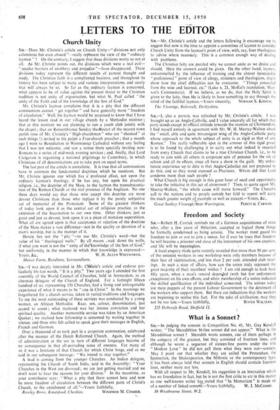• SIR, - 1 - was deeply interested in Mr. Claistie's article and
endorse par- ticularly his last words, "It is a pity." Two years ago I attended the first assembly of the World Council of Churches, held in Amsterdam, as an alternate delegate of the Church of England. For a fortnight fifteen hundred of us, representing 150 Churches, had a living and unforgettable experience of what it means to be "one in Christ." In the mornings we forgathered for a church service, taken in varied traditions and languages. To me the most outstanding of these services was conducted by a young woman, an African Methodist. Race, sex, colour, denomination, just ceased to count ; what mattered was her intense conviction, and her
• spiritual quality. Another memorable service was taken by an American Quaker ; we realised how fellowship is cemented by waiting together in silence, and three who felt called to speak gave their messages in English, French and German.
Over a thousand of us took part in a corporate communion, celebrated after the manner of the Dutch Reformed Church. Again, the method of administration or the use in turn of-different languages become of no consequence in that all-pervading sense of oneness. For many of us it was a foretaste of that Church for which Christ longs, and as we said in our subsequent message: "We intend to stay together."
A lead is coming from the younger Churches. An Indian delegate, • representing the Church of South India, said in the Assembly: "Your Churches in the West are divorced ; we are just getting married and we don't want to hear the reasons for your divorce." In the meantime, as your contributor says: "What a pity that there cannot here •and now be more freedom of circulation between the different parts of Christ's • Church, to the enrichment of all."—Yours faithfully,






































 Previous page
Previous page